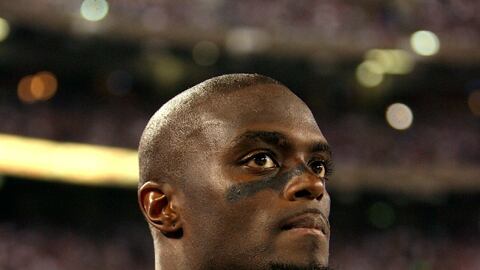
The New York Giants may have just clinched a first-round bye in the playoffs, but if they’re going to repeat as Super Bowl champions they’ll have to do it without the man who caught the game-winning touchdown last year.
That’s because wide receiver Plaxico Burress was suspended following his arrest last month after accidentally shooting himself in the leg with a concealed, illegal gun at a New York City nightclub. A few days after the incident, Mayor Mike Bloomberg publicly and passionately stated that "it would be an outrage if we didn't prosecute to the fullest extent of the law… Particularly people who live in the public domain, who make their living because of their visibility; they're role models for our kids.” And ever since, I've been asked countless times, "What's going to happen to Plax?" And not just by Giant fans.
“More people than you think are walking around the city with legally licensed guns.”
Right now the court of public opinion has judged Plaxico guilty of committing an act of stupidity—he was officially sentenced by Stephen Colbert on The Colbert Report, who made him the word of the day—but being convicted in criminal court will require more than just “truthiness.”
So what's going to happen?
My guess is that Burress will have a change of uniform next season, but it won’t be a prison uniform. And here's why:
New York State Law has four degrees of firearms possession—one is a misdemeanor, three of them are felonies, but only the top two carry mandatory sentencing—and it will be very hard for the DA's office to get a conviction for possession in the first or second degree.
In a nutshell, it comes down to intent.
Did Burress possess a weapon with the intent to use it in any criminal act? That's what those serious mandatory minimums (and three-and-a-half years is serious) are for—a person carrying a gun who's looking to hold up someone, or use it in a drug deal, or some other nefarious act.
Now, unless Plaxico told someone he was packing in order to hurt somebody, or he was heard threatening someone, or perhaps sent an incriminating email or text message, I just don't see the DA's office being able to prove the intent needed for a conviction for possession in the first or second degree.
Like it or not, New York State Law—and the Supreme Court’s interpretation of the Second Amendment—grant citizens the right to bear arms. New York is tougher than other cities, and to get a permit here you have to show that you need it for self-defense. But more people than you think are walking around the city with legally licensed guns: shop owners who carry a lot of cash to and from the bank, for instance, because they’re seen as potential targets.
And these days so are big-time athletes. They certainly see themselves that way. ESPN The Magazine’s December 1 cover story was titled “ Players are Living Scared,” and details how NFL players feel like targets, especially after the murder of the Washington Redskins’ Sean Taylor in November 2007. Pittsburgh Steelers quarterback Ben Roethilsberger told ESPN how, after being confronted by a person with a weapon, he “ decided to have someone with me all the time.”
A week before Burress’ gun went off, his teammate and friend Steve Smith was robbed at gunpoint, and Plaxico had his own home in Florida burglarized in January 2005. Burress even has a permit to carry a gun in Florida—a fact his attorneys, no doubt, will bring before the court as proof that he has considered himself a target.
None of this means its smart to go dancing with an unlicensed gun in your pants, nor does it mean Plaxico shouldn’t be prosecuted, nor that he won’t be found guilty—of a lesser charge than first- or second-degree possession. And that’s what will happen—and it won’t be a misdemeanor.
My prediction: Plaxico’s lawyers will look to resolve this after the season ends, when things have quieted down, and he’ll end up pleading guilty to a second-degree possession—which means a felony conviction, and probably a good amount of community service but no jail time. In the meantime look for Plaxico to show up at a few more charity events, like the fundraiser for the homeless he attended last weekend. And look for more articles in your local papers about other players who have been the victims of violence and stalkers.
A conviction of second-degree possession may not satisfy Mayor Bloomberg, or many other New Yorkers, but it will satisfy the law.
Gerald Lefcourt, a past President of the National Association of Criminal Defense Lawyers, is one of the nation’s leading trial attorneys, having represented such diverse clients as Abbie Hoffman, Harry Helmsley, and Irv Gotti.





